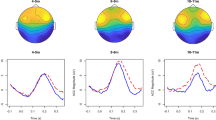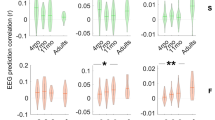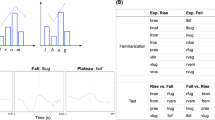Abstract
Infants aged 4–6 months discriminate the fine phonetic differences that distinguish syllables in both their native and unfamiliar languages1,2,3, but by 10–12 months their perceptual sensitivities are reorganized so that they discriminate only the phonetic variations that are used to distinguish meaning in their native language12. It would seem, then, that infants apply their well honed phonetic sensitivities as they advance and begin to associate words with objects, but the question of how speech perception sensitivities are used in early word learning has not yet been answered. Here we use a recently developed technique to show that when they are required to pair words with objects, infants of 14 months fail to use the fine phonetic detail they detect in syllable discrimination tasks. In contrast, infants of 8 months—who are not yet readily learning words—successfully discriminate phonetic detail in the same task in which infants aged 14 months fail. Taken together, these results suggest a second reorganization in infants's use of phonetic detail as they move from listening to syllables to learning words.
This is a preview of subscription content, access via your institution
Access options
Subscribe to this journal
Receive 51 print issues and online access
$199.00 per year
only $3.90 per issue
Buy this article
- Purchase on Springer Link
- Instant access to full article PDF
Prices may be subject to local taxes which are calculated during checkout


Similar content being viewed by others
References
Kuhl, P. K. in Handbook of Infant Speech Perception Vol. 2(eds Salapatek, P. & Cohen, L.) 275–382 (Academic, New York, (1987)).
Jusczyk, P. W. in Handbook of Perception and Cognition, 11: Speech, Language, and Communication(eds Miller, J. L. & Eimas, P. D.) 263–301 (Academic, Orlando, Florida, (1995)).
Werker, J. in Invitation to Cognitive Science: Language(eds Gleitman, L. R. & Liberman, M.) 87–106 (MIT Press, Cambridge, MA, (1995)).
Benedict, H. Early lexical development: Comprehension and production. J. Child Lang. 6, 183–200 (1979).
Oviatt, S. L. The emerging ability to comprehend language: An experimental approach. Child Dev. 51, 97–106 (1980).
Spelke, E. S., Vishton, P. & Van Hofsten, C. in The Cognitive Neurosciences(ed. Gazzaniga, M.) 165–179 (MIT Press, Cambridge, MA, (1994)).
Woodward, A. in Twenty-fourth Annual Child Language Research Forum(ed. Clark, E.) 35–45 (Cambridge University Press, Cambridge, MA, (1993)).
Turkewitz, G. & Kenny, P. A. Limitations on input as a basis for neural organization and perceptual development: A preliminary theoretical statement. Dev. Psychobiol. 15, 357–368 (1982).
Newport, E. Maturational constraints on language learning. Cog. Sci. 14, 11–28 (1990).
Barton, D. The Development of Communication(eds Waterson, N. & Snow, C.) 255–261 (Wiley, New York, (1978)).
Charles-Luce, J. & Luce, P. A. An examination of similarity neighborhoods in young children's receptive vocabularies. J. Child Lang. 22, 727–735 (1995).
Werker, J. F. & Tees, R. C. Cross-language speech perception: Evidence for perceptual reorganization during the first year of life. Infant Behav. Dev. 7, 49–63 (1984).
Acknowledgements
We thank J. A. R. Carr and R. C. Tees for comments on earlier drafts, and M.Bhatnager for her help in testing infants. We also thank the parents and infants who participated in the study. This research was supported by a Natural Sciences and Engineering Research Council of Canada Grant to J.F.W. and a NSERC Doctoral Scholarship to C.L.S.
Author information
Authors and Affiliations
Corresponding author
Rights and permissions
About this article
Cite this article
Stager, C., Werker, J. Infants listen for more phonetic detail in speech perception than in word-learning tasks. Nature 388, 381–382 (1997). https://doi.org/10.1038/41102
Received:
Accepted:
Issue Date:
DOI: https://doi.org/10.1038/41102
This article is cited by
-
Elementary math in elementary school: the effect of interference on learning the multiplication table
Cognitive Research: Principles and Implications (2022)
-
Examining Preverbal Infants’ Ability to Map Labels to Facial Configurations
Affective Science (2021)
-
Early language acquisition: cracking the speech code
Nature Reviews Neuroscience (2004)
Comments
By submitting a comment you agree to abide by our Terms and Community Guidelines. If you find something abusive or that does not comply with our terms or guidelines please flag it as inappropriate.



